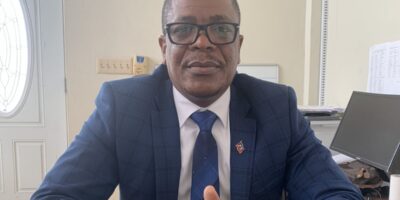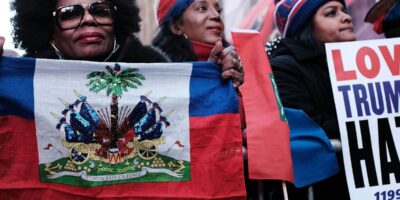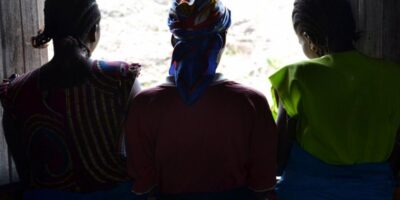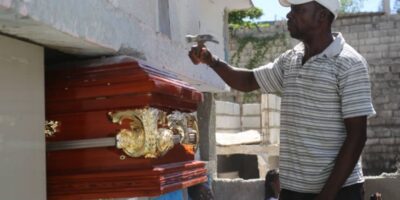Instead of the aroma of soup joumou, they are confronted with the smell of burning homes and bodies.
I celebrated January 1st with the traditional « soup joumou, » commemorating Independence and Ancestors’ Day. This day always brings back happy memories from my youth – staying up all night playing with friends, visiting family, and sharing soup joumou with neighbors. It was a day filled with hope and possibilities.
Yet today, many young people in Haiti have been deprived of ever being able to live and create their own cherished experiences. Instead of the aroma of soup joumou, they are confronted with the smell of burning homes and bodies. As they navigate through gang wars only the fortunate few survive though homeless, hungry, and terrified. For them, 2024 dawned not with hope, but with the uncertainty of what the next day would bring, and whether they will escape hell on earth.
Haiti stands at a crossroads, its future hanging precariously in the balance. We, the Haitian people, are confronted with a stark reality: crippling violence, a stagnating economy, and a dysfunctional education system. Yet, amidst this bleak landscape, hope flickers. Our resilience, ingenuity, and unwavering spirit offer the potential for transformative change. This is not a time for lamenting the past. It is a time for collective action, for laying the foundations for a new Haiti, brick by brick.
Yet today, many young people in Haiti have been deprived of ever being able to live and create their own cherished experiences
This is why I continue to engage with other organizations as part of the Kowalisyon Dyalòg Ayisyen, which has developed a Manifesto that provides a framework to engage civil society on the core value of inclusivity. The manifest for a dialogue is a civil society engagement to achieve a democratic and prosperous Haiti.
Indeed, two centuries have passed since our ancestors overthrew French colonialism, and 37 years since the fall of the Duvalier regime. The 1987 Constitution promised a fresh start, but today, our society is fragmented, our economy is in ruin, and our politics are deeply divided. We have become so comfortable blaming others that it has become instinctive. We say that their strategy is to divide and conquer. Still, we allow ourselves to be divided but we cannot overlook history. It was Haitian hands that plunged the dagger into Dessalines’s back. We cannot turn our face from our reality. It is Haitian hands that are used to kidnap, burn, loot, and indiscriminately maim and murder innocent men, women, children, and the elderly.
We can blame the international community but the current crises are the result of our lack of vision, and internal division combined with over two centuries of exploitation by Haitian intellectual, economic, and political elites. We have marginalized and dehumanized a significant portion of our population. Our vocabulary of oppression has evolved and transitioned from the derogatory terms of « Bosal » and « Kongo » to « Nèg mòn » and « Nèg andeyò, » and most recently to the slur of « Kokorat. » Despite the shifting labels, the faces hidden behind these terms remain constant and invisible. Yet, in a cruel twist, today, these elites watch with fear the videos of these same « Kokorats » distributing cash-filled envelopes to the population like feudal lords. Our voices are reduced to whispers of « Kòmandan, » « Patwon, » and « Chèf » as we beg for passage or the release of a loved one.
We say that their strategy is to divide and conquer. Still, we allow ourselves to be divided but we cannot overlook history.
To break free from this cycle of despair requires a profound self-reckoning. We must acknowledge our historical complicity in shaping this sad reality and commit to a transformative vision – a nation built on inclusivity and justice. While international actors may have given us the hammer, it is our hands, not theirs, that wield it. We are the carpenters with the agency to choose whether to build, brick by brick, a new Haiti or perpetuate the cycle of destruction.
Twa Wòch Dife: The Three Pillars
As a kid, I remember visiting my grandfather in « Morne a Chandèlle, » a communal section of Gressier in the Western Department of Haiti. I recall the « Twa Wòch Dife, » the three-stone stove the women used this cook. This model is central in every countryside kitchen. I learned that the careful placement of each stone was critical for balance. Similarly, I see three foundational pillars – security, economy, and education – as crucial for Haiti’s stability. Additionally, civic participation is the firewood that drives social transformation.
For Haiti to achieve stability, I believe, will require a strategic focus on these “wòch (rocks).” Security is foundational, without which fear and violence prevail. A robust economy provides opportunities and resources, and an adaptable education system equips future generations for success.
Security: The Foundation of Democracy
Security is the first wòch, essential for a thriving democracy. Only in a safe environment can citizens fully participate in political and economic activities. In my previous article in Ayibopost, a Five-point Strategy for Sustainable Security, I proposed some tactics to address the gang crisis. They include:
- Reinforcing Elite Units: Strengthen the Haitian National Police (HNP) and army’s special forces to take the lead in confronting gangs.
- Community Policing with International Support: Regular HNP officers, partnered with international forces, ensure both effective community policing and reduced corruption.
- Nationalizing Private Security: The estimated 75,000 individuals working for private firms can be regulated and integrated into legitimate security efforts.
I strongly believe Haitians must lead the fight to secure their country. The context and math also make it clear that Haiti needs international support. As such, I support the UN-approved Kenyan contingent. The Kenyans like the Brazilians before do not have the responsibility to solve Haiti’s political disagreements. The task of nation-building rests on our shoulders. We have failed at that task before, blaming interventions instead of looking internally. This time, we must succeed. We owe it to ourselves and future generations.
While law enforcement plays a vital role, security goes beyond strengthening the police. We must invest in a professional, accountable, and fair justice system to break the cycle of impunity. True security also demands building trust with communities and addressing the exclusion that is at the root of violence.
Economy: Fostering Equitable Prosperity
The second « wòch » is an economy that thrives, fostering equitable prosperity for all Haitians. This requires a collective commitment to dismantling the bureaucratic barriers we’ve erected. These barriers serve two insidious purposes: enriching civil servants through graft and keeping out competitors. They stifle the entrepreneurial spirit and hinder the creation of new businesses, ultimately impeding economic growth and opportunity.
Our collective imagination is captured by the « Kanal. » Let’s imagine if we applied that same principle to diverse sectors beyond agriculture – to manufacturing, energy production, construction, and tourism. Imagine the thriving fields, the humming factories, and the bustling markets showcasing local creations. This vibrant Haiti, powered by our ingenuity and spirit, is within reach.
However, this engine of progress requires a strong and fair judicial system as its foundation. We must tear down the internal roadblocks, both physical and societal, that impede development. Infrastructure is a prime example. For years, formal toll systems, crucial for road repairs and construction, were dismissed due to the population’s ingrained aversion to taxes. If such a system were put in place they likely would have protested. Ironically, the gangs demonstrated the practicality of such systems by collecting « tolls » within their territories. This inconvenient reality holds a valuable lesson: internal ingenuity, when coupled with responsible governance, can pave the way for innovative solutions.
Education: Cultivating Future Leaders
The third « wòch » is not simply education, but a robust and responsive system that cultivates future leaders right here, on Haitian soil. Haitian families, fueled by their unwavering belief in education’s transformative power, sacrifice everything to send their children to school, even across the border to the Dominican Republic. This exodus starkly reveals the shameful shortcomings of our educational system. Tens of thousands of Haitian students endure not only hefty tuition fees but also the overwhelming burden of housing, food, and transportation in a foreign land, on top of facing abuse, discrimination, and indignities.
Still, parents from Haiti and the diaspora transfer hundreds of millions of US dollars to the Dominican Republic every year. This is not just a drain on individual families; it’s a missed opportunity for Haiti. The loss is not just financial; it’s the doctors who could be treating patients in Haiti, the engineers who could be building our infrastructure, and the entrepreneurs who could be driving our economy.
Currently, 80% of our schools are private. We need to flip the script and make 80% public. This requires innovative solutions, and one possibility lies in public-private partnerships. I propose a model where the government invests its limited resources in building school infrastructure. Parents in Haiti would continue paying school fees, while diaspora hometown associations act as bridges for parents abroad to fund teachers’ salaries and school equipment for a set number of years. These schools would be governed by a board comprised of parents, community leaders, diaspora representatives, and local elected officials, fostering transparency and community ownership. They would also demonstrate good governance to both students and adults.
Civic Participation: The « Chabon » of Democracy
Civic engagement is the essential heat, the “chabon (charcoal)” that fuels the fire of a vibrant democracy. In building a new Haiti, every citizen must become a stoker, tending that chabon and feeding it with active participation. While I understand the disillusionment many feel towards democracy, its promised potential for positive change remains undimmed. That’s why I propose strengthening our democratic fabric by making electoral participation mandatory. This suggestion echoes a recommendation from the American bipartisan Commission on the Practice of Democratic Citizenship, outlined in their report “The Way Forward: Essential Reinvention of American Constitutional Democracy” We cannot stop at voting, which is just the first spark. To truly fan the flames of active citizenship, we must consider implementing mandatory national service for citizenship. This service would have three vital objectives:
- Leveling the basic education of young people.
- Providing a program to upskill them in key trades.
- Offering an option as a reintegration and rehabilitation program for those leaving gangs.
National service can foster a sense of civic duty, equip individuals with valuable skills, and create opportunities for those seeking a path away from violence.
Building Together, one Wòch at a Time
Haiti stands at a defining moment. Our challenges are immense, but so is our potential for change. We can lay the foundations for a new Haiti, one brick at a time. Our focus on security, economy, and education – balanced and interconnected – can ignite transformative action. It’s time to move beyond ideals, actively participate in rebuilding, and embrace « L’Union Fait la Force » as a motto and a call to action.
As we start a new year, I invite you, fellow citizens, advocates, and activists, and especially the members of the Kowalisyon Dyalòg Ayisyen to engage the Haitian diaspora in this collective effort. Let’s set aside differences and together write a new chapter in Haiti’s history. It’s time to build the Haiti we dream of, rock by hopeful rock to achieve balance, equity and justice.
Cover Image : | © Jean Feguens Regala/AyiboPost
Stay in touch with AyiboPost through :
► Our WhatsApp channel : click here
► Our WhatsApp Community : click here
► Our Telegram canal : click here







Comments